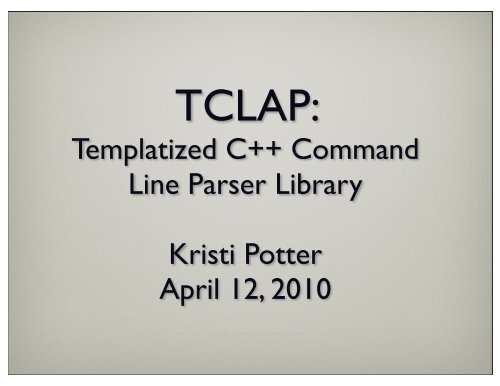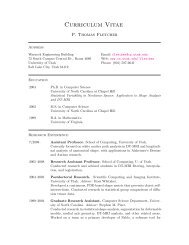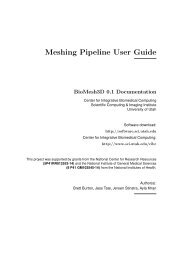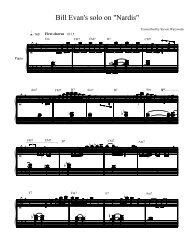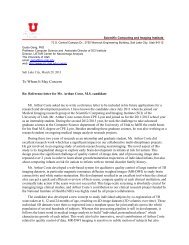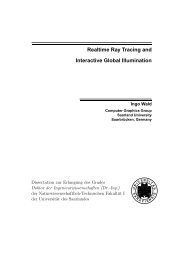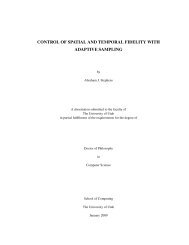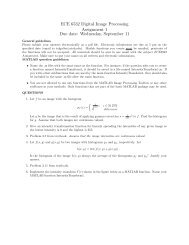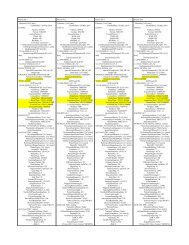Templatized C++ Command Line Parser Library Kristi Potter April 12 ...
Templatized C++ Command Line Parser Library Kristi Potter April 12 ...
Templatized C++ Command Line Parser Library Kristi Potter April 12 ...
You also want an ePaper? Increase the reach of your titles
YUMPU automatically turns print PDFs into web optimized ePapers that Google loves.
TCLAP:<br />
<strong>Templatized</strong> <strong>C++</strong> <strong>Command</strong><br />
<strong>Line</strong> <strong>Parser</strong> <strong>Library</strong><br />
<strong>Kristi</strong> <strong>Potter</strong><br />
<strong>April</strong> <strong>12</strong>, 2010
What is TCLAP?<br />
Templated c++ command line parser<br />
• simple interface<br />
• templated argument list<br />
• only header files<br />
#include <br />
• automatically print out usage/help<br />
messages<br />
2
$ ./testTCLAP --help<br />
USAGE:<br />
./testTCLAP [-n ] [--] [--version] [-h]<br />
Where:<br />
-n , --name Name to print<br />
--, --ignore_rest Ignores the rest of the labeled<br />
arguments following this flag.<br />
--version Displays version information and exits.<br />
-h, --help Displays usage information and exits.<br />
testTCLAP description message<br />
3
Overview - classes<br />
• Cmd<strong>Line</strong>: manages the command line<br />
definition and passes parsing to appropriate arg<br />
classes<br />
• ValueArg, MultiArg, SwitchArg,<br />
MultiSwitchArg,UnlabeledValueArg,<br />
UnlabeledMultiArg: templated argument<br />
classes, each argument contains its data after<br />
parsing<br />
4
Example*<br />
// Define the command line object<br />
Cmd<strong>Line</strong> cmd("Description message", ' ', "1.0");<br />
// Define a value argument<br />
ValueArg nameArg("n","name","Name to print",<br />
true,"Homer", "string");<br />
// Add it to the command line object<br />
cmd.add( nameArg );<br />
// Parse the command line<br />
cmd.parse( argc, argv );<br />
// Get the value<br />
string name = nameArg.getValue();<br />
5<br />
* must wrap in a try/catch
Cmd<strong>Line</strong> Class<br />
Cmd<strong>Line</strong> ( const std::string &message,<br />
const char delimiter = ' ',<br />
const std::string &version = "none",<br />
bool helpAndVersion = true)<br />
• message: displayed in usage output<br />
• delimiter: separates argument flag from value<br />
• version: displayed in --version<br />
• helpAndVersion: create message switches<br />
6
Argument Classes - Construction<br />
TCLAP::Argument ( const std::string & flag,<br />
const std::string & name,<br />
const std::string & desc,<br />
bool req,<br />
T value)<br />
• flag: single character flag ( -h )<br />
• name: long argument name ( --help )<br />
• desc: description of arg displayed in help msg<br />
• req:<br />
flag if the argument is required<br />
• value: default value of the argument<br />
7
Argument Classes -<br />
ValueArg/MultiArg<br />
• read a value of the templated type<br />
• returns a single value ( ValueArg )<br />
$ ./testTCLAP -a value<br />
• or a vector of values ( MultiArg )<br />
$ ./testTCLAP -a multival1 -a multival2<br />
8
Argument Classes -<br />
SwitchArg<br />
• on/off boolean switch<br />
• doesn’t parse a value<br />
• return true/false depending on if the switch<br />
is found & the default value of the switch<br />
• If the switch is set on the command line,<br />
then the getValue method will return the<br />
opposite of the default value for the switch.<br />
9
Argument Classes -<br />
MultiSwitchArg<br />
• switch that can be specified multiple times<br />
• useful when command lines are<br />
constructed automatically from within<br />
other applications<br />
• ex: -V means a little verbose<br />
-V -V -V means a lot verbose<br />
• getValue returns the # of times the arg<br />
appears on the command line<br />
10
Argument Classes -<br />
UnlabeledValueArg<br />
• value arg that is not defined by a flag, but by<br />
it’s position in the argv array<br />
$ ./tclapCopyFiles file1 file2<br />
• the order in which these args are added to<br />
the command line object is the order in<br />
which they will be parsed<br />
11
Argument Classes -<br />
UnlabeledMultiArg<br />
• more than one value can be specified<br />
• only one UnlabeledMultiArg per<br />
command line<br />
• reads the values up until the end of argv<br />
• must be the last value in the command line<br />
<strong>12</strong>
Good to know...<br />
• Combining switch args<br />
$ command -a -b -c<br />
or<br />
$ command -abc<br />
or<br />
$ command -ba -c<br />
13
Good to know...<br />
• One arg, or the other, but not both<br />
or<br />
cmd.xorAdd(Arg& a, Arg& b);<br />
cmd.xorAdd(vectorxorList);<br />
14
Good to know...<br />
• Want flags that are longer than a single character<br />
( ie -f vs --flag )<br />
- force the long option ( --flag ) by leaving the<br />
first parameter blank<br />
ValueArg fileArg("","file","File name",<br />
true,"val","filename");<br />
15
Good to know...<br />
• More options in manual...<br />
- constrain the values allowed for a particular<br />
argument<br />
- hex integers as arguments<br />
- ignore certain arguments<br />
- different output than what is provided.<br />
- args add themselves to the Cmd<strong>Line</strong><br />
- use different, non standard types like std::pair<br />
16
Get It!<br />
• http://tclap.sourceforge.net/<br />
• licensed under the MIT License<br />
17


